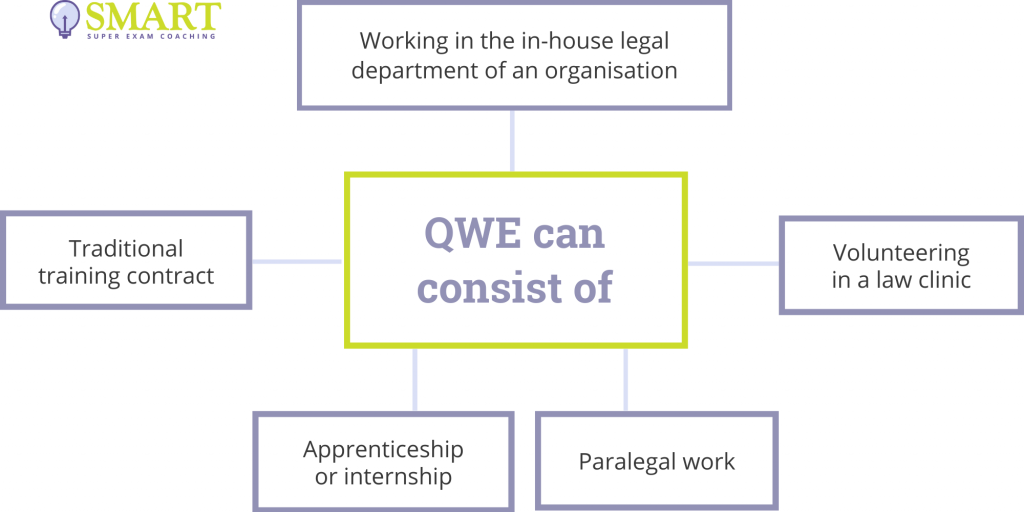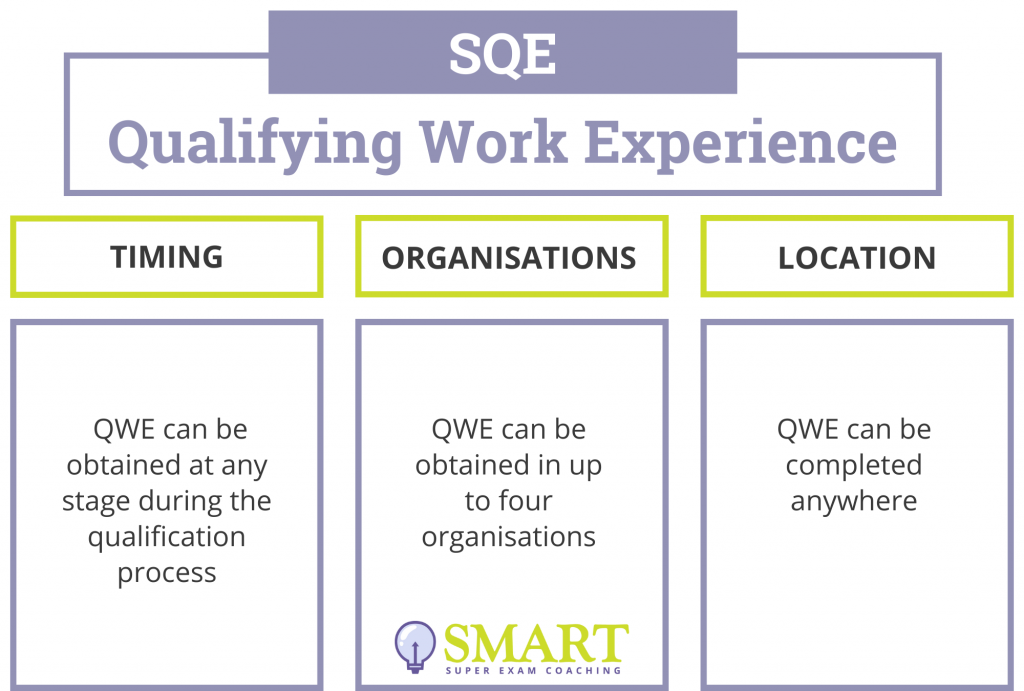One key requirement for qualifying as a solicitor in England and Wales is gaining real-life work experience. Traditionally, this meant securing a formal two-year training contract with a licensed law firm – an incredibly competitive and challenging task. The limited number of contracts, despite many capable candidates, often made securing one more about luck than talent.
The good news is that the process has already changed, making the work experience component of qualification much more flexible and accessible for aspiring solicitors. Since September 2021, the new SQE qualifying work experience (QWE) process has been in place. Below, we outline this updated process and address the most common questions.
Preparing for SQE1 or SQE2? Our dedicated resources are here to help you succeed:
What is Qualifying Work Experience (QWE)?
As part of its overhaul in the qualification process and the introduction of the Solicitors Qualifying Examination (SQE) in September 2021, the SRA has made significant changes to the work experience requirement. Now, instead of one official training contract, aspiring solicitors must complete two years (full-time, or part-time equivalent) of QWE, meaning Qualifying Work Experience.
Where can I gain QWE?
QWE must be completed in law firms or in legal services roles in other organisations. Qualifying work experience can include any work where the candidate is providing legal services and has the opportunity to develop competences as laid out in the Statement of Solicitor Competence. QWE can be performed in up to four organisations in England, Wales, or overseas, and can consist of (amongst others):
- Traditional training contract
- Paralegal work
- Apprenticeship or internship
- Working in the in-house legal department of an organisation
- Volunteering in a law clinic

When should QWE be completed?
Qualifying work experience can be obtained at any stage in the qualification process, i.e. before, during, or after sitting the SQE assessments. This means that candidates can really shape their educational journey into more of a practical experience.
It is now possible to learn the reality of the job on the ground at the same time as studying and learning the law.
But it is expected that most candidates will start their QWE after passing stage 1 of the SQE.
Who can sign off my SQE QWE?
QWE must be signed off by a qualified solicitor of England and Wales (who does not need to hold a practising certificate) or a Compliance Officer for Legal Practice (COLP). If the organisation does not have a COLP or a qualified solicitor to confirm the qualifying work experience, it is also possible for candidates to get confirmation from a solicitor from outside the organisation, as long as they have direct knowledge of the candidate’s work. The solicitor or COLP must confirm:
- the duration of the QWE
- that the candidate had opportunities to develop solicitor competences
- that no character or suitability issues arose
In case of an external solicitor to confirm your QWE, the SRA imposes additional requirements compared to an internal verifier. The external QWE verifier must review your actual work during the placement and provide confirmation to the SRA. This process includes obtaining feedback from the individual(s) supervising your work.
Other than confirmation by a qualified solicitor, SQE QWE is not assessed by the SRA. There is no requirement to work in specific areas of law, or even to cover English and Welsh law, as this will be assessed in the SQE.
What are the advantages of QWE (SQE) vs training contract (LPC)?
Compared to the traditional LPC/training contract route, the SQE qualifying work experience route has several distinct advantages:
Timing:
- Rather than completing two years in one stint after completing studies, the two years of QWE can be built up in multiple stints in up to four organisations. There is no minimum length of time for QWE placements.
- QWE can be obtained at any stage during the qualification process, i.e. before, during, or after sitting the SQE1 and SQE2 assessments. This means it is even possible for students to secure paid legal employment to fund their studies while preparing for the SQE.
Organisations:
- Rather than having to complete a training contract in one law firm, the SQE qualifying work experience can be obtained in up to four organisations. This allows candidates to gain a wider breadth of experience in different industries or roles.
Location:
- Rather than having to secure a training contract within the competitive UK market, SQE QWE can be completed anywhere. International students could undertake legal work in their home country while studying for the SQE assessments, or could choose to seek opportunities for work experience in the UK if they wish.
- This flexibility and the overall format of the SQE means that it is now much easier for foreign students to qualify as solicitors of England and Wales, or for foreign-qualified lawyers to obtain dual qualification, from abroad. The route to qualification is now the same for domestic and international candidates, and apart from perhaps needing to travel for the actual assessments, all study, preparation, and work experience can be performed from anywhere.
- This also benefits the industry as a whole, with greater opportunities for cross-territorial knowledge exchange and bringing niche skills and experience into England and Wales.

Validating your SQE QWE with the Academy of Smart Lawyers
Academy of Smart Lawyers is collaborating with a reputable legal firm and offers comprehensive SQE QWE verification services. We operate on a global scale, so your location is not a limiting factor. Our expertise primarily lies in working with Asian jurisdictions such as:
- Hong Kong
- Singapore
- China
- South Korea
- India, and others
What’s next?
If you need assistance in confirming your QWE for the SQE, please complete the questionnaire.
We are well-equipped to support legal professionals in their pursuit of the SQE and in their legal careers in the UK.
FAQs
Do you need a training contract for the SQE?
No! Qualifying work experience can be completed either in a traditional training contract format or in shorter stints in up to four organisations. There is no longer a technical requirement for a formal training contract.
Do training contracts stop with the introduction of SQE?
No! While formal two-year training contracts will no longer be required to qualify as a solicitor, it is likely that many city law firms will continue to offer solicitor training in this traditional format. Candidates are then free to choose if they want to pursue a two-year SQE training contract in a law firm or to build up their QWE in a variety of different roles and organisations. It is also worth noting that even if candidates choose a traditional training contract, they are not necessarily tied to that law firm as they would have been under the old regime. If the training contract is terminated or dropped early, for any reason, the period worked still counts towards the QWE requirement and the remaining time can be completed elsewhere.
SQE or LPC: Which route to take?
For aspiring solicitors who have already started or accepted a placement offer in a traditional law degree, GDL, or LPC before September 2021, there is a choice. The SRA will continue to authorise LPC courses up to the end of the 2025/26 academic year, so it is still possible to pursue the traditional route of completing the LPC and securing a formal training contract. However, bear in mind that many course providers may start phasing out their LPC offerings before that date. With the SQE replacing LPC as a much cheaper, more flexible and accessible route, it is likely that most current students will pursue qualification under this new regime.
One more important point to note is that foreign-qualified lawyers, for instance, will need to pass the SQE1 and SQE2 exams, but they do not have to gain two years of qualifying work experience, as the SRA will recognise their existing qualification and professional legal experience. You can learn more about the possible exemptions for different categories of candidates here.
If you require guidance on SQE exemptions, please complete the form provided. Complete the form here.
How long does it take to complete the SQE?
Notwithstanding the two-year QWE requirement, the SQE is undoubtedly a very challenging set of assessments to pass and requires significant time and effort to complete successfully. The time needed to prepare for and pass these assessments will greatly depend on the individual candidate’s existing knowledge, skills, and legal experience.
The SQE assessments are based on the Qualified Lawyers Transfer Scheme (QLTS) assessments, which was the previous route for foreign-qualified lawyers to become dual-qualified lawyers in England and Wales.
We have extensive experience in sitting, passing, and helping other candidates to pass the QLTS OSCE assessments and have harnessed our knowledge of these assessments to build a dedicated training platform and service.
Our SUPERexam platform has been custom-built to help candidates prepare for the SQE2 assessments in a flexible and affordable manner. We provide SQE training centered around practical mock stations (learn more about SQE mocks here) which give candidates the opportunity to practice realistic simulations of the SQE2 assessments with personalised feedback.
Can I complete the QWE requirement after passing SQE 1 and SQE 2 exams?